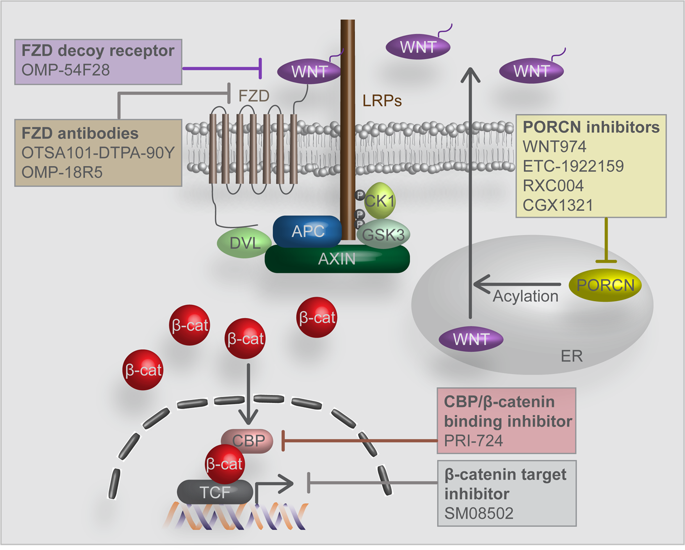当前位置:
X-MOL 学术
›
Exp. Mol. Med.
›
论文详情
Our official English website, www.x-mol.net, welcomes your feedback! (Note: you will need to create a separate account there.)
Wnt signaling in cancer: therapeutic targeting of Wnt signaling beyond β-catenin and the destruction complex.
Experimental & Molecular Medicine ( IF 12.8 ) Pub Date : 2020-02-10 , DOI: 10.1038/s12276-020-0380-6 Youn-Sang Jung 1 , Jae-Il Park 1, 2, 3
Experimental & Molecular Medicine ( IF 12.8 ) Pub Date : 2020-02-10 , DOI: 10.1038/s12276-020-0380-6 Youn-Sang Jung 1 , Jae-Il Park 1, 2, 3
Affiliation

|
Wnt/β-catenin signaling is implicated in many physiological processes, including development, tissue homeostasis, and tissue regeneration. In human cancers, Wnt/β-catenin signaling is highly activated, which has led to the development of various Wnt signaling inhibitors for cancer therapies. Nonetheless, the blockade of Wnt signaling causes side effects such as impairment of tissue homeostasis and regeneration. Recently, several studies have identified cancer-specific Wnt signaling regulators. In this review, we discuss the Wnt inhibitors currently being used in clinical trials and suggest how additional cancer-specific regulators could be utilized to treat Wnt signaling-associated cancer.
中文翻译:

癌症中的Wnt信号传导:Wnt信号传导的治疗靶点超出β-连环蛋白和破坏复合物。
Wnt /β-catenin信号传导与许多生理过程有关,包括发育,组织稳态和组织再生。在人类癌症中,Wnt /β-catenin信号被高度激活,这导致了用于癌症治疗的各种Wnt信号抑制剂的发展。然而,Wnt信号传导的阻断引起副作用,例如组织稳态和再生的损害。最近,一些研究已经确定了癌症特异性Wnt信号调节剂。在这篇综述中,我们讨论了目前在临床试验中使用的Wnt抑制剂,并提出了如何利用其他特定于癌症的调节剂来治疗Wnt信号相关的癌症。
更新日期:2020-02-10
中文翻译:

癌症中的Wnt信号传导:Wnt信号传导的治疗靶点超出β-连环蛋白和破坏复合物。
Wnt /β-catenin信号传导与许多生理过程有关,包括发育,组织稳态和组织再生。在人类癌症中,Wnt /β-catenin信号被高度激活,这导致了用于癌症治疗的各种Wnt信号抑制剂的发展。然而,Wnt信号传导的阻断引起副作用,例如组织稳态和再生的损害。最近,一些研究已经确定了癌症特异性Wnt信号调节剂。在这篇综述中,我们讨论了目前在临床试验中使用的Wnt抑制剂,并提出了如何利用其他特定于癌症的调节剂来治疗Wnt信号相关的癌症。



























 京公网安备 11010802027423号
京公网安备 11010802027423号